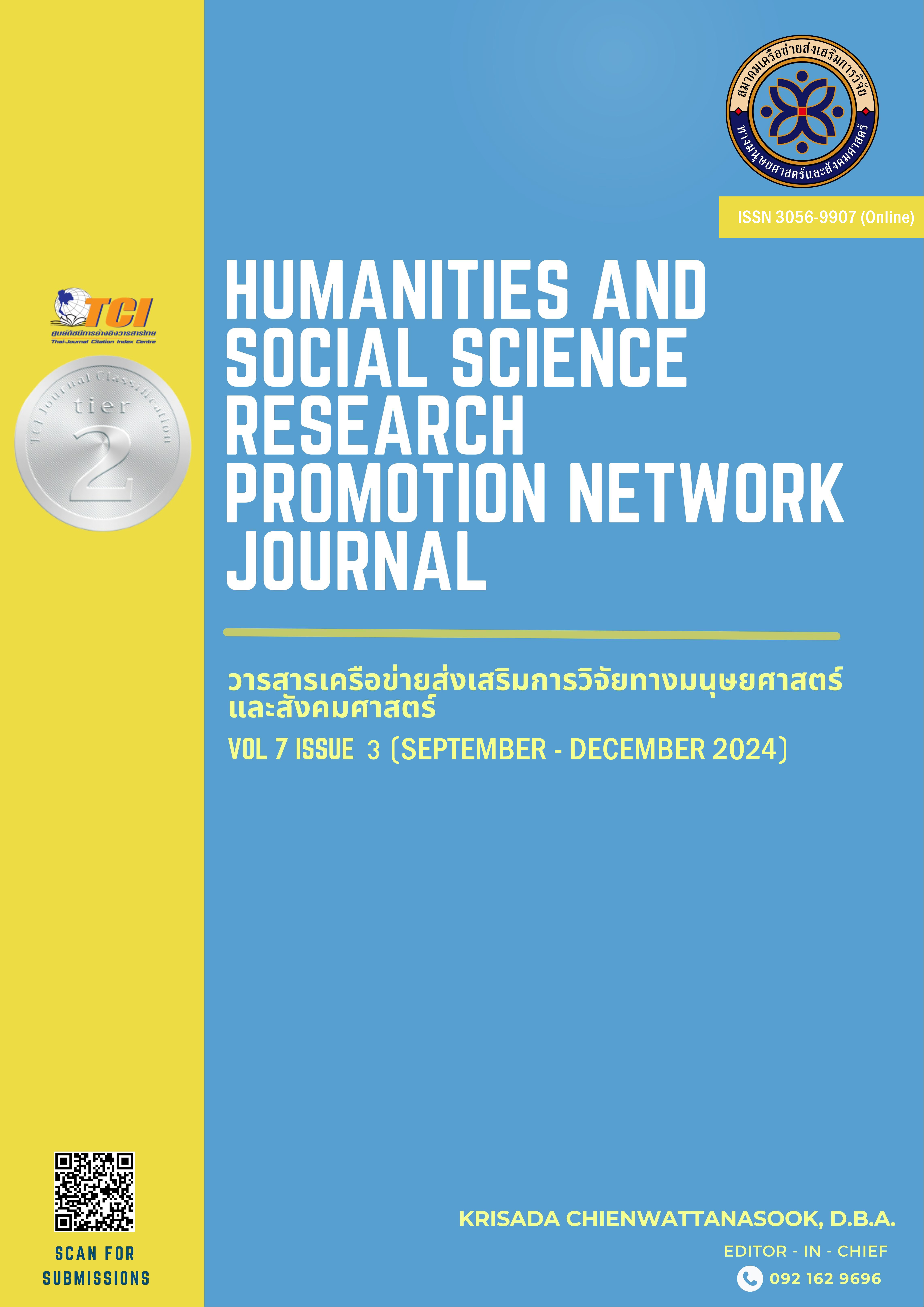สภาพแวดล้อมการทำงานและภาวะผู้นำเชิงการเปลี่ยนแปลงที่มีต่อประสิทธิภาพ การปฏิบัติงานของพนักงานในบริษัท Zhanchen New Materials Group Co., Ltd.
คำสำคัญ:
สภาพแวดล้อมการทำงาน, ภาวะผู้นำเชิงการเปลี่ยนแปลง, ประสิทธิภาพการปฏิบัติงานของพนักงานบทคัดย่อ
การวิจัยนี้มีวัตถุประสงค์เพื่อศึกษาสภาพแวดล้อมการทำงานที่มีอิทธิพลต่อประสิทธิภาพการทำงานของพนักงานในบริษัท Zhanchen New Materials Group Co., Ltd. และเพื่อศึกษาภาวะผู้นำการเปลี่ยนแปลงที่มีอิทธิพลต่อประสิทธิภาพการทำงานของพนักงานในบริษัทเดียวกัน ประชากรที่ใช้ในการวิจัยคือพนักงานของบริษัท Zhanchen New Materials Group Co., Ltd. โดยมีกลุ่มตัวอย่างจำนวน 300 คน สุ่มตัวอย่างด้วยวิธีการสุ่มแบบอาศัยความน่าจะเป็นแบบการสุ่มแบบชั้นภูมิ เครื่องมือที่ใช้ในการเก็บรวบรวมข้อมูลคือแบบสอบถาม และวิเคราะห์ข้อมูลด้วยสถิติเชิงพรรณนา ได้แก่ ความถี่ ร้อยละ ค่าเฉลี่ย และส่วนเบี่ยงเบนมาตรฐาน และสถิติเชิงอนุมานโดยใช้วิธี Partial Least Square Structural Equation Modeling (PLS-SEM) ผลการวิจัยพบว่า สภาพแวดล้อมการทำงานและภาวะผู้นำการเปลี่ยนแปลงมีอิทธิพลต่อประสิทธิภาพการทำงานของพนักงานอย่างมีนัยสำคัญทางสถิติ โดยมีอำนาจการพยากรณ์ร้อยละ 83.9 และยังพบว่าภาวะผู้นำการเปลี่ยนแปลงมีอิทธิพลมากกว่าสภาพแวดล้อมการทำงานต่อประสิทธิภาพการทำงานของพนักงาน ดังนั้น องค์กรสามารถนำข้อมูลไปใช้เพื่อปรับปรุงสภาพแวดล้อมการทำงาน โดยเน้นที่การจัดหาอุปกรณ์ที่ทันสมัย การจัดการสภาพแวดล้อมทางกายภาพ และการวางผังพื้นที่ทำงานอย่างเหมาะสม นอกจากนี้ ภาวะผู้นำการเปลี่ยนแปลงยังแสดงให้เห็นถึงความสำคัญในการสร้างแรงบันดาลใจ ส่งเสริมการคิดเชิงวิพากษ์ และการมีส่วนร่วมในการตัดสินใจของพนักงาน การส่งเสริมให้ผู้นำมีอิทธิพลเชิงบวกสามารถนำไปสู่การพัฒนาความสามารถของพนักงาน และเพิ่มประสิทธิภาพการทำงานโดยรวมขององค์กร
เอกสารอ้างอิง
Armstrong, M. (2020). Armstrong's handbook of human resource management practice. Kogan Page Publishers.
Ashkanasy, N. M., Ayoko, O. B., & Jehn, K. A. (2014). Understanding the physical environment of work and employee behavior: An affective events perspective. Journal of Organizational Behavior, 35(8), 1169–1184. https://doi.org/10.1002/job.1973
Atmojo, M. (2012). The influence of transformational leadership on job satisfaction, organizational commitment, and employee performance. International Research Journal of Business Studies, 5(2), 113-128. https://doi.org/10.21632/irjbs
Avolio, B. J., & Yammarino, F. J. (2013). Transformational and charismatic leadership: The road ahead. Emerald Group Publishing.
Bass, B. M. (1985). Leadership and performance beyond expectations. Free Press.
Bass, B. M., & Riggio, R. E. (2006). Transformational leadership. Psychology Press.
Blahová, J., & Pauliková, A. (2021). Work environment, mental and physical workload in relation to the sustainability of an industrial plant. In INTED2021 Proceedings (pp. 6763-6769). IATED.
Buil, I., Martínez, E., & Matute, J. (2019). Transformational leadership and employee performance: The role of identification, engagement and proactive personality. International journal of hospitality management, 77, 64-75. https://doi.org/10.1016/j.ijhm.2018.06.014
Burns, J. M. (1978). Leadership. Harper & Row.
Burns, J. M. (2003). Transforming leadership: A new pursuit of happiness. Grove Press.
Bushiri, C. P. (2014). The impact of working environment on employees’ performance: The case of institute of finance management in Dar Es Salaam region [Unpublished doctoral dissertation]. The Open University of Tanzania.
Diamantidis, A. D., & Chatzoglou, P. (2019). Factors affecting employee performance: An empirical approach. International Journal of Productivity and Performance Management, 68(1), 171-193. https://doi.org/10.1108/IJPPM-01-2018-0012
Gomes, A. R. (2014). Transformational leadership: Theory, research, and application to sports. In C. Mohiyeddini (Ed.), Contemporary topics and trends in the psychology of sports (pp. 53-114). Nova Science Publishers.
Hair, J. F., Black, W. C., Babin, B. J., & Anderson, R. E. (2010). Multivariate data analysis (7th ed.). Pearson.
Henseler, J., Hubona, G., & Ray, P. A. (2016). Using PLS path modeling in new technology research: updated guidelines. Industrial management & data systems, 116(1), 2-20. https://doi.org/10.1108/IMDS-09-2015-0382
Koh, D., Lee, K., & Joshi, K. (2019). Transformational leadership and creativity: A meta-analytic review and identification of an integrated model. Journal of Organizational Behavior, 40, 625-650. https://doi.org/10.1002/job.2355
Li, H., Sajjad, N., Wang, Q., Ali, A. M., Khaqan, Z., & Amina, S. (2019). Influence of transformational leadership on employees’ innovative work behavior in sustainable organizations: Test of mediation and moderation processes. Sustainability, 11, 1-21. https://doi.org/10.3390/su11061594
Ng, T. W. H. (2016). Embedding employees early on: The importance of workplace respect. Personnel Psychology, 69(3), 599–633. https://doi.org/10.1111/peps.12117
Patel, V., Chesmore, A., Legner, C. M., & Pandey, S. (2022). Trends in workplace wearable technologies and connected‐worker solutions for next‐generation occupational safety, health, and productivity. Advanced Intelligent Systems, 4(1), 2100099. https://doi.org/10.1002/aisy.202100099
Pinder, C. C. (2014). Work motivation in organizational behavior. Psychology Press.
Reza, M. H. (2019). Components of transformational leadership behavior. EPRA International Journal of Multidisciplinary Research, 5(3), 119-124.
Rivaldo, Y., & Nabella, S. D. (2023). Employee performance: Education, training, experience and work discipline. Calitatea, 24(193), 182-188. http://dx.doi.org/10.47750/QAS/24.193.20
Riyanto, S., Sutrisno, A., & Ali, H. (2017). The impact of working motivation and working environment on employees performance in Indonesia Stock Exchange. International Review of Management and Marketing, 7(3), 342-348.
Sander, E. J., Caza, A., & Jordan, P. J. (2019). The physical work environment and its relationship to stress. In O. Ayoko, & N. Ashkanasy (Eds.), Organizational Behaviour and the Physical Environment (pp. 268-284). Routledge.
Shammout, M. (2021). The impact of work environment on employees performance. International Journal of Current Research in Science Engineering & Technology, 3(11), 78-101.
Sheikh, M. R., Abbas, T., & Qureshi, S. U. (2021). Factors influencing job satisfaction among employees of engineering firms in Pakistan. Journal of Asian Development Studies, 10(4), 7-19.
Steinmann, B., Klug, H. & Maier, G. W. (2018). The path is the goal: how transformational leaders enhance followers’ job attitudes and proactive behavior. Frontiers in psychology, 9, 23-38. https://doi.org/10.3389/fpsyg.2018.02338
Stockemer, D., Stockemer, G., & Glaeser, J. (2019). Quantitative methods for the social sciences (Vol. 50, p. 185). Springer International Publishing.
Sun, R., & Henderson, A. C. (2016). Transformational leadership and organizational processes: Influencing public performance. Public Administration Review, 77(4), 1-12. https://doi.org/10.1111/puar.12654
Szabo, P., Mlkva, M., Vanova, J., & Markova, P. (2017). Employee performance in the context of the problems of measurement and evaluation in practice. Research Papers Faculty of Materials Science and Technology Slovak University of Technology, 25(41), 63-70. https://doi.org/10.1515/rput-2017-0022
Triansyah, A, F., Hejin, W., & Stefania, S. (2023). Factors affecting employee performance: A systematic review. Journal Markcount Finance, 1(3), 150-159. https://doi.org/10.55849/jmf.v1i2.102
Yukl, G. (2013). Leadership in organizations. Pearson Education.
Yusuf, E., Wahyuddin, W., Thoyib, A., Ilham, R. N., & Sinta, I. (2022). The effect of career development and work environment on employee performance with work motivation as intervening variable at the office of agriculture and livestock in Aceh. International Journal of Economic, Business, Accounting, Agriculture Management and Sharia Administration, 2(2), 227-236. https://doi.org/10.54443/ijebas.v2i2.191
ดาวน์โหลด
เผยแพร่แล้ว
รูปแบบการอ้างอิง
ฉบับ
ประเภทบทความ
สัญญาอนุญาต
ลิขสิทธิ์ (c) 2024 เต๋อหัว หวัง, จิตรลดา ตรีสาคร

อนุญาตภายใต้เงื่อนไข Creative Commons Attribution-NonCommercial-NoDerivatives 4.0 International License.
บทความที่ได้รับการตีพิมพ์เป็นลิขสิทธิ์ของ ผู้เขียน
ทัศนะและความคิดเห็นที่ปรากฏในบทความในวารสารเครือข่ายส่งเสริมการวิจัยทางมนุษยศาสตร์และสังคมศาสตร์จะถือเป็นความรับผิดชอบของผู้เขียนบทความนั้น และไม่ถือเป็นทัศนะและความรับผิดชอบของกองบรรณาธิการ








